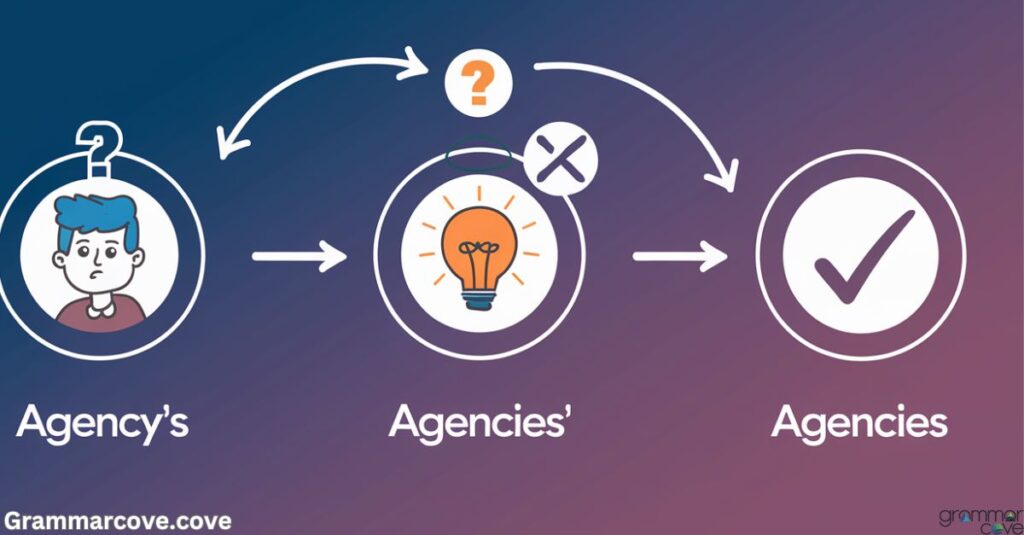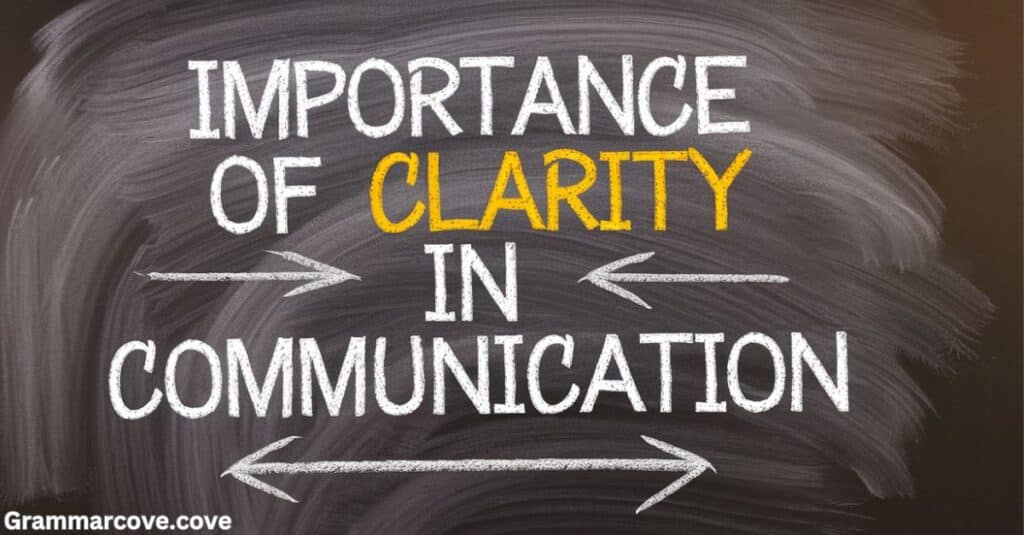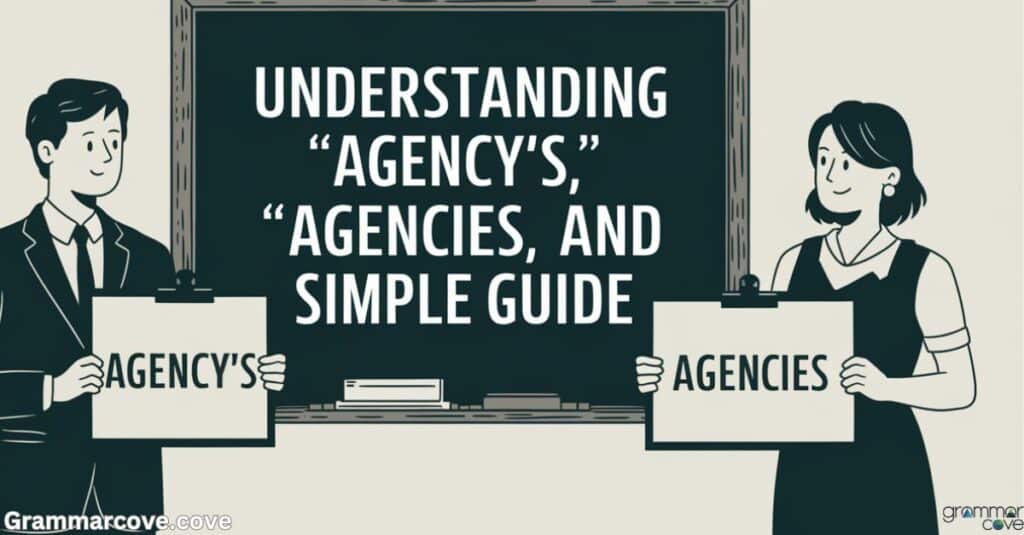Introduction:

In the world of English grammar, precision matters. Misusing terms can lead to confusion and miscommunication, especially in professional settings. Among the commonly misused terms are “agency’s,” “agencies’,” and “agencies.” While they may appear similar at first glance, each has a distinct meaning and application.
Mastering these terms not only enhances your communication skills but also reflects a level of professionalism that is crucial in today’s workplace.
What Are We Talking About?
When diving into the world of English grammar, you may stumble upon terms that seem deceptively similar yet serve distinct purposes. Today, we’ll explore the nuances of “agency’s,” “agencies’,” and “agencies.” Understanding these terms can enhance your communication skills and improve your professional interaction. Let’s clarify these differences so you can navigate your corporate communication with confidence and ease.
The Different Forms
Before we delve into specific definitions, let’s briefly examine the roles of these three terms:
| Term | Definition | Example |
|---|---|---|
| Agency’s | Possessive form of one agency | “The agency’s report was insightful.” |
| Agencies’ | Possessive form of multiple agencies | “The agencies’ partnership improved outreach.” |
| Agencies | Refers to multiple agencies without possession | “Several agencies attended the conference.” |
Each form plays a critical role in written communication and formal correspondence. Knowing when and how to use them correctly can significantly impact the clarity and professionalism of your message.
When to Use “Agency’s”
Definition:
“Agency’s” is the possessive form of “agency.” Use it when you want to show that something belongs to one specific agency.
Example in a Sentence:
Imagine you receive an email from Sarah, the manager of a marketing agency. She might say:
“Please find attached the agency’s latest project proposal. We believe it aligns perfectly with your objectives.”
In this scenario, Sarah emphasizes that the project proposal belongs to her agency. Such clarity in workplace communication helps maintain office etiquette and ensures that all parties understand the context.
Scenario Example:
Suppose you’re coordinating a community outreach program and receive this email:
Subject: Community Outreach Initiative
From: Sarah Johnson
To: Team Members
Hi Team,
I’m excited to share that our agency’s outreach initiative has received positive feedback from the community. The proposed activities will strengthen our ties and build trust among local residents.
Let’s discuss how we can enhance our efforts in the upcoming meeting.
Best,
Sarah
In this email, Sarah effectively communicates the achievements of her agency, emphasizing ownership and initiative.
When to Use “Agencies’”
Definition:
“Agencies’” is the possessive form of “agencies.” Use this term when discussing something that belongs to more than one agency.
Example in a Sentence:
Let’s say you’re discussing a joint project involving multiple agencies. You might write in a team meeting note:
“The agencies’ collaboration has produced innovative solutions that benefit all stakeholders.”
In this case, the note indicates that the collaboration involves several agencies, reinforcing the importance of effective networking in a professional context.
Scenario Example:
Consider this email from Tom, the project coordinator:
Subject: Joint Project Update
From: Tom Ramirez
To: All Partners
Dear Partners,
I’m pleased to report that the agencies’ efforts in the joint marketing campaign have resulted in increased visibility for all involved. The data shows a 30% increase in community engagement since the launch.
Please prepare for our next meeting where we will discuss further strategies.
Regards,
Tom
Here, Tom highlights the successful collaboration among multiple agencies, making clear that the achievements belong to them collectively.
When to Use “Agencies”
Definition:
“Agencies” refers to multiple agencies without implying possession. Use this term when you want to discuss them in general terms.
Example in a Sentence:
During a presentation, you might say:
“Many agencies are adapting to the new digital landscape to better serve their clients.”
This statement highlights the collective actions of various agencies and is essential for workplace professionalism. It conveys a sense of awareness about industry trends, which is vital for business relationships.
Scenario Example:
Imagine giving a presentation to a group of potential clients:
Slide Title: Industry Trends
Presentation Note:
“As we navigate the evolving market, it’s essential to recognize that several agencies are leading the charge in adopting innovative strategies. This shift not only enhances service delivery but also strengthens client trust.”
In this context, the term agencies is used to discuss the broader landscape of the industry without indicating possession.
Easy Tips to Remember
To help you remember which term to use, consider these simple tips:
| Tip | Description |
|---|---|
| Think about possession | If you’re indicating that something belongs to one agency, use “agency’s.” For multiple agencies, it’s “agencies’.” If you’re just talking about them in general, stick with “agencies.” |
| Context matters | Reflect on the context of your message. Are you discussing a project? An initiative? Understanding the context can guide you to the right term. |
| Practice in Emails | Incorporate these terms into your email etiquette practice. For instance, when drafting emails, consciously use these terms correctly to enhance your formal correspondence. |
By following these tips, you’ll find it easier to choose the right term in various situations, from emails to presentations.
Importance of Clarity in Communication

Clear communication is vital in any professional setting. Misusing terms can lead to misunderstandings, affect business relationships, and ultimately impact productivity. Here’s a brief table summarizing the importance of clarity:
| Aspect | Importance |
|---|---|
| Avoid Confusion | Misunderstandings can lead to costly mistakes in projects and partnerships. |
| Enhance Professionalism | Using correct grammar and terms reflects well on your professional demeanor and boosts your reputation. |
| Build Trust | Clear and precise communication fosters trust among colleagues and clients. |
By ensuring you use terms correctly, you contribute to a more efficient and harmonious workplace.
Real-Life Applications
Let’s look at some scenarios where these terms can come into play in various professional settings:
Scenario 1: Email Correspondence
Imagine you’re working on a project with an external agency. You might send an email like this:
Subject: Project Timeline Update
From: Alex Carter
To: External Agency Team
Hi Team,
I’d like to confirm the timeline for our project. The agency’s milestones have been crucial in keeping us on track. Please provide your updates by the end of the week.
Thanks,
Alex
In this case, Alex uses “agency’s” to emphasize the milestones belonging to the specific agency.
Scenario 2: Team Meetings
During a team meeting, you might discuss ongoing partnerships:
“I’d like to commend the agencies’ teamwork on the latest campaign. Their combined efforts have not only increased engagement but also established a strong brand presence.”
Here, the term “agencies’” is used to reflect the collective work of multiple agencies.
Scenario 3: Industry Analysis
When analyzing market trends in a report, you could write:
“Many agencies are pivoting towards digital solutions, illustrating a significant shift in the industry landscape.”
This usage indicates a general discussion about multiple agencies without possession.
Conclusion
Understanding the difference between “agency’s,” “agencies’,” and “agencies” may seem minor, but mastering these distinctions can significantly enhance your verbal communication and written communication. By applying these tips, you’ll not only improve your grammar but also boost your overall workplace professionalism.
In today’s fast-paced business environment, clear and precise communication is key to building strong business relationships and effective teamwork. So the next time you write an email or prepare a report, keep these terms in mind. With a little practice, you’ll navigate the nuances of English like a pro!
Ultimately, enhancing your understanding of these terms will empower you to convey your ideas more clearly and effectively, leading to better outcomes in your professional life.


